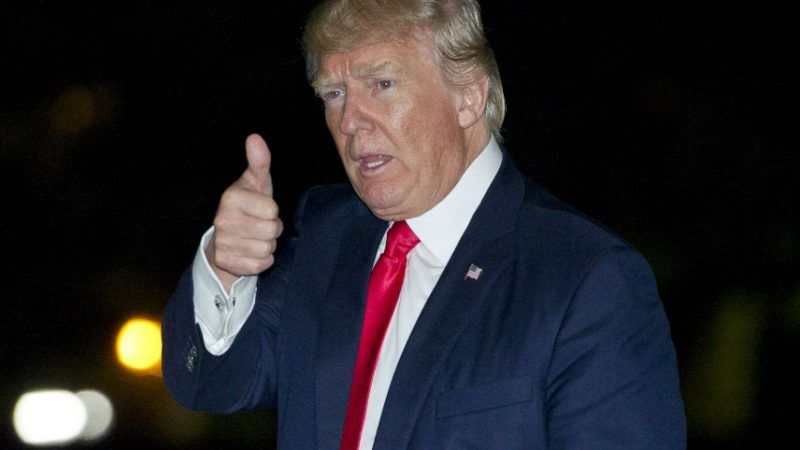Trump Tariff Talk Shows It's Time for Congress to Reclaim Some Power
The more Congress cedes its own authority to the executive branch, the greater is the executive branch's temptation to act like King George III.

"I want you to know, this is my view. I want tariffs. And I want someone to bring me some tariffs… I know there are some globalists in the room right now. And they don't want them, John, they don't want the tariffs. But I'm telling you, I want tariffs." — President Trump, speaking to his new chief of staff at an Oval Office meeting about trade and taxes on imports, as reported by Jonathan Swan of Axios
The most charitable view of this is that Trump or his allies are leaking it as a bluff, to strengthen their hand in trade negotiations with Mexico and China. In this view, the president doesn't really intend to saddle American consumers or businesses with taxes on imported goods.
The least charitable view of it is that Trump is a dangerous fool when it comes to trade economics, and that he risks throwing America into a recession, a war, or both.
Consider, after all, the history of tariffs. British-imposed tariffs on tea, paper goods, and other products imported into the American colonies so angered the colonists that they fought the American Revolution. The Smoot-Hawley Tariffs of 1930 worsened the Great Depression. And Richard Nixon's 10 percent tariff on imports, announced in 1971 together with the suspension of the convertibility of the dollar to gold, contributed to making the 1970s synonymous with stagflation.
The real villain in this story here, though, isn't so much President Trump as it is the U.S. Congress. The Constitution, in Article I, gives Congress, not the president, the "power to lay and collect taxes, duties, imposts and excises" and "to regulate commerce with foreign nations." As a December 2016 report from the Congressional Research Service outlines, Congress has gradually delegated more and more of this power to the executive branch, in legislation including that infamous Tariff Act of 1930 and also, more recently, the Trade Act of 1974.
One can make a case that such delegation is unconstitutional. Alas, however, the Supreme Court, in cases such as Marshall Field & Co. v. Clark, and J.W. Hampton, Jr. & Co. v. United States, has found that case unpersuasive.
So rather than relying on the Supreme Court to prevent Congress from handing over its Constitutional powers to the president, the onus is on Congress to take them back. That would take tariff policy out of closed-door Oval Office meetings and put it back in Congress, where open hearings are more common, and where the bicameral process might make it harder to impose tariffs without intense opposition from the interests that would be adversely affected. At least any member of the House of Representatives who voted for a tariff would have to face voters within two years.
The one senator at the moment who seems to grasp the importance of the issue is Mike Lee of Utah. Lee has introduced the Global Trade Accountability Act, which would essentially prevent the president from imposing tariffs unless Congress approves them. In a press release announcing the bill, Lee said, "Congress has ceded far too much law making power to the Executive branch including the power to unilaterally raise tariffs." The bill has support from Americans for Tax Reform and from the Club for Growth.
Voters made Donald Trump president and elected a Republican Congress in part because they wanted to see taxes heading downward, not upward. A tariff is a tax. It may be imposed on foreign manufacturers, but the people who end up ultimately paying it are American consumers. If Trump doesn't comprehend that, maybe the Republican Congress will.
When the Constitution was written, the memory of British tea being dumped in Boston harbor as a protest against tariffs—taxation without representation—was still relatively fresh. It's no wonder the framers vested the taxation and commerce regulation powers in Congress, the most representative of the three branches of the federal government.
Trump also has lately been defending Jefferson and Washington in the context of removal of monuments to slaveholders. It sure would be strange of him to turn around and start denouncing Boston Tea Party anti-tariff heroes like Samuel Adams as "globalists."
The more Congress cedes its own authority to the executive branch, the greater is the executive branch's temptation to act like King George III. If relations between the Republican congressional leadership and Trump are as bad as they are reported to be, and even if they aren't, this would be a fine area for Congress to start asserting some of its Constitutional authority, and a fine time to start doing it.


Show Comments (24)